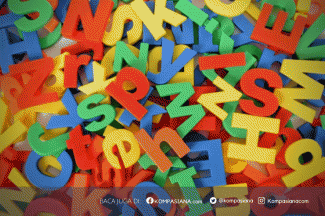Name: Neng Hilmi Nurmaltuffah
Nisal Fatya aulia
English Material for Beginners
- How to Learn English?
Learning English material for beginners is something that maybe some people still have difficulty determining the types of questions and how to learn them. Starting from the grammar that you need to master, the types of tenses, hundreds of thousands of vocabularies, not to mention the proper pronunciation and spelling. Various mistakes that occur when practicing a foreign language sometimes make you reluctant to continue it again. You can lose confidence, feel too difficult or become bored studying for the umpteenth time.
You don't need to worry and be afraid, okay? English isn't that scary if you start to recognize the basic concepts and functions of words that are part of constructing simple sentences. It is similar to Indonesian in that it has basic categories in its sentences. We are here to study the most basic topics and which you will often use later when communicating with friends or new people in English.
Fundamentally, the simple concept of sentence forms that you learn in English material for beginners is knowing the role of words that are arranged and form an idea, so that you can fully understand information from someone. You will certainly learn the basics of words starting from subjects, verbs, objects, and some supporting vocabulary. For the record, each sentence can use different tenses to determine when the event took place. Come on, let's look at the explanation of the material one by one. including the following:
- The Role of Subject and Object in Sentences
The function of the subject is as the perpetrator of the action who is carrying out an activity or activity in the sentence. The object is the recipient of the action that is affected by the activity of the subject or actor in the sentence. You can use various types of nouns as subjects or objects as long as the roles of these two words don't change or are exchanged. The nouns or nouns that you use can be living things such as humans or animals, or inanimate objects such as plants or objects around you, even other abstract things that cannot be seen.
Examples of subjects with pronouns: I (me), you (you), they (them), we (us), she (he is for women), he (he is for men), it (for animals, inanimate objects and abstract objects that are not more than one). Examples of subjects with real names of people or things: Mr. John, Mrs. Susan, Samuel, my friend, cat, house, the book, our apartment, the Earth, the Sun, environment, information.As for the object form with personal or noun pronouns: Me (me), you (you), them (them), us (us), her (he is for women), him (he is for men), it (for animals) , inanimate objects and abstract objects that are not more than one).
- Verb as The Action of The Subject
- A verb that has a function as an action performed by the subject in a sentence. Written activities or activities can be in the form of movements or expressions that can be seen. Verb can be an action that appears abstractly (not clearly visible, readable only in thoughts or feelings). Action Verb (action of physical activity and visible to the eye): jump (melompat), cry (menangis), laugh (ketawa), dance (menari), play (bermain), eat (bermain), and many more. Stative or non Action Verb (referring to appearance, smell, state, thought, value): like, believe, think, look/see, understand, and so on.
- *To-be Verb: is a replacement verb that will appear if there is no action in the sentence and can change depending on the type of tense you use. In its simplest form, to-be verbs can be is, am, are.
- General Vocabulary
- In understanding English material for beginners, you will find some common vocabulary that people often use in their daily activities. Memorizing some new words is important so that you understand the essence of some simple conversations and two-way communication can work well.
- *Adjective (adjective): This is a type of complementary word to show the quality or beauty of an object, unit of weight, surface or texture, unit of height, and state of feeling or mind: happy, sad, amazing, nice, long, short, soft, heavy, beautiful, expensive, difficult, easy, and others.
- *Nouns (nouns) can be animate, inanimate, and abstract (can't be seen): house, elephant, human, nature, teacher, classroom, door, building, star, planet, and many more.
- *Date & Time (day, month) serves to show the details of the time of occurrence of the action that the subject performed. So that people can understand the information specifically. For example: Monday, Friday, August, May, week, month, year, weekend, weekday, and so on.
- Present & Past To Know Time of Event
- Actually there are various kinds of present and past forms that you can use in using English both orally and in writing. Here you will focus more on learning the types of present and past which are very common and are always used in everyday life. Let's find out the differences between each one, shall we!
Simple Present Tense
In this type of tenses, the events or events you are talking about will be in the present and validly acknowledged. But there will be various conditions that describe different information focuses. You can also pay attention to two Simple Present Tense sentence patterns with those that have verbs and those that don't have verbs:
